|
The
Council in its new composition
of 48 Member States got down to
business on 11 October 2011, and
will complete its work on 21
October. As the Union’s
governing body, the Council’s
role is to consider broad
telecommunication policy issues
to elucidate the path that the
Union should follow. The Council
is also responsible for the
vitally important task of
approving biennium budgets for
ITU’s work, and controlling the
Union’s finances and
expenditure.
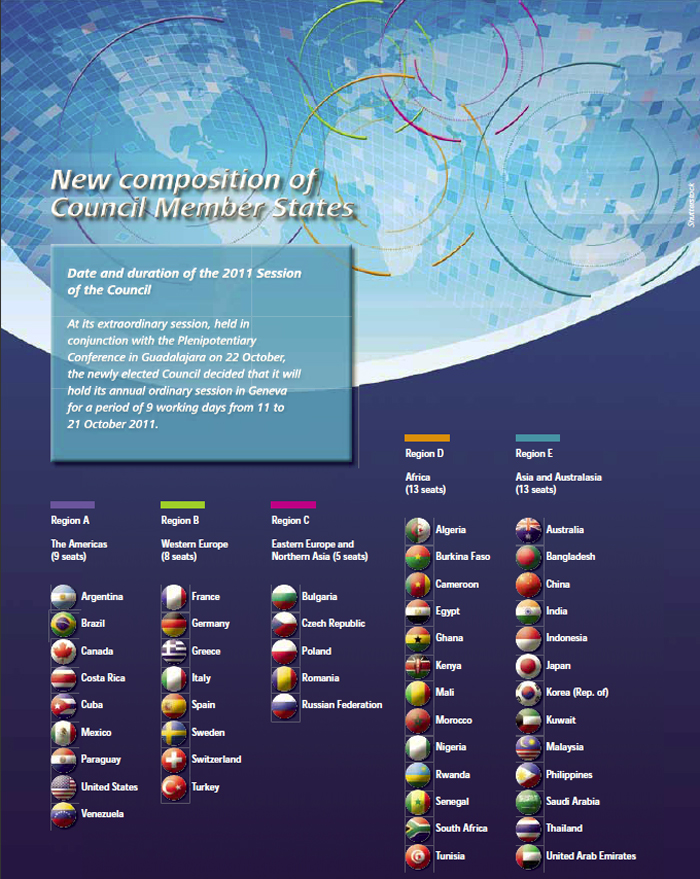
New composition of Council Member States |
The Secretary-General’s
State of the Union Address
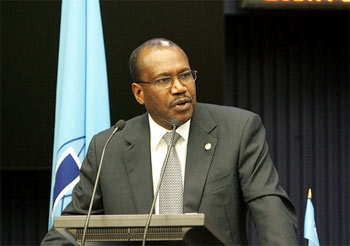
ITU Secretary-General
Dr Hamadoun Touré |
In his
state of the Union address,
ITU Secretary-General Dr
Hamadoun I. Touré highlighted
the major issues on the
Council’s agenda. These include:
addressing the strategic plan
and budget of the Union for
2012-2013, and reviewing
implementation of the landmark
decisions from the
Plenipotentiary Conference in
Guadalajara, Mexico, in October
2010. Dr Touré also outlined the
major events that will shape the
information and communication
technology (ICT) landscape, and
these include ITU Telecom World
2011, which will be celebrating
its 40th anniversary in Geneva
from 24 to 27 October, and many
others mentioned in this first
issue of the Council 2011
Highlights. “The hottest issue
we have to address in terms of
ICT development in the coming
years is how to create the new
digital highways needed to
accommodate the massive increase
in data,” Dr Touré stated.
On staff relations: The Secretary-General gave
“full credit to the Staff Council for its
outstanding achievements over the past year in
working to improve relations between staff and
management.” He underlined that both sides had
shown “a willingness to cooperate – and perhaps
even more importantly to compromise…” He added
that he remained committed to working hard to
resolve any issue affecting staff. “The staff
are the lifeblood of the Union, and without them
– and their commitment and enthusiasm – we would
simply not exist,” Dr Touré said.
Leadership of Council 2011
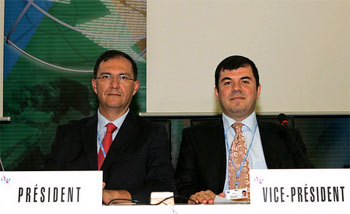
ITU Council 2011 Chairman and Vice-Chairman
Fernando Borjón (Mexico) and
Ahmet Cavusoglu (Turkey) |
Mexico’s
Fernando Borjón (Region A – The
Americas) has been elected
Chairman of this year’s session
of the Council, taking over the
rotating chairmanship from
Region E (Asia and Australasia).
Mr Borjón, who was Vice-Chairman
last year, also ably chaired the
Plenipotentiary Conference in
Guadalajara. The
vice-chairmanship this year
falls to Region B (Western
Europe), and went to Ahmet
Cavusoglu of Turkey.
In his
opening address, Mr Borjón noted that the world is
evolving rapidly, and that
telecommunications is a
fundamental agent of this
change. “We are here to focus on
strategies to facilitate the
work of ITU in shaping the
global agenda for information
and communication technologies,”
Borjón said.
Leadership of the Council’s
Standing Committee on
Administration and Management
has also changed, with Blanca
Gonzalez of Spain as Chairman,
alongside Vice-Chairmen Ms C.
Greenway of Australia and Marcin
Krasuski of Poland.
A minute of
silence for Nabil Kisrawi
Councillors
paid tribute to Nabil Kisrawi, a
passionate participant at ITU
conferences and meetings
stretching back over three
decades. Nabil, as they all
called him, passed away on 29
January 2011. Nabil spoke for
his country, the Syrian Arab
Republic, the Arab Group, the
developing countries and the
whole membership. His mastery of
the subjects being discussed,
and his ability to pop up at
just the right moment to push a
decision one way — or prevent it
going another way — was
extraordinary and will surely be
missed. With a glance that
missed nothing and a mind that
retained everything, Nabil could
recall decisions taken in myriad
meetings, and the history of how
those decisions had been
reached.
Popov Room’s high-tech facelift commended
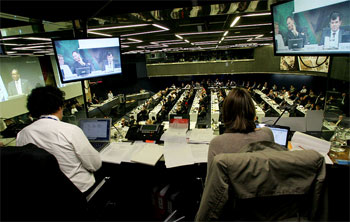 Councillors
commended ITU for giving the Popov room a high-tech facelift. Named after
Alexander Stepanovich Popov (1859-1906) — the Russian physicist and
radiocommunications pioneer — the newly refurbished conference room in the
second basement of the ITU Tower is now a more modern, inspiring place for decision-making. Councillors
commended ITU for giving the Popov room a high-tech facelift. Named after
Alexander Stepanovich Popov (1859-1906) — the Russian physicist and
radiocommunications pioneer — the newly refurbished conference room in the
second basement of the ITU Tower is now a more modern, inspiring place for decision-making.
The Ambassador and Permanent
Representative of the Russian
Federation addressed special
thanks to the Secretary-General
for the high-tech facelift, for
which funds were provided by the
Russian Federation through the
National Radio Technical Bureau.
On a
different note, the Russian
Ambassador commended the
Secretary-General for the frank
and open discussions he held in
June this year with Prime
Minister Vladimir Putin of the
Russian Federation, during his
historic visit to Geneva, where
he held bilateral meetings with
a number of Chief Executives of
the United Nations agencies.
Report on the Implementation of
the Strategic Plan and
Activities of the Union for
2010-2011
ITU Deputy Secretary-General,
Houlin Zhao, presented Document
C11/35 (Report on the
implementation of the strategic
plan and the activities of the
Union for 2010-2011). The report
covers the second half of 2010
and the first half of 2011. Mr
Zhao said that the report was
forward-looking, already using
the new format of the strategic
plan adopted in Guadalajara for
2012-2015.
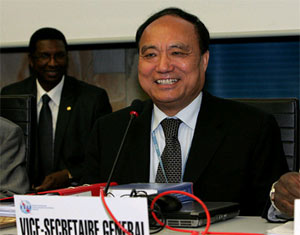
ITU Deputy Secretary-General
Mr Houlin Zhao |
Views from the floor
On the whole, the report was
well received. Honduras, while
supporting the report, commented
that e-health and schools were
topics of important focus (in
Honduras) and so
young people should be mentioned
more. For Cuba, the report needs
to be standardized and the
length of the contributions
should be balanced between the
Union’s three Sectors and the
General Secretariat. Also, Cuba
stated that repetitive full
description of activities and
events in several sections
should be avoided, but otherwise
supports the report. Canada also
supports the report and
mentioned that the Council
Working Group on Financial
Regulations had endorsed the
modifications to the section of
the strategic plan relating to
the outputs of ITU’s
Telecommunication Development
Sector (ITU-D). The United
Kingdom supports the report, as
does Japan, whose delegation
thanked ITU for the enormous
help during the earthquake and
tsunami that struck the country
in March this year. Malaysia,
having queried the meaning of
paragraphs 72 to 75 related to
the proposed modifications,
supports the report, following
clarification.
The report was approved,
including the revised outputs to
the ITU-D section of the
strategic plan, which had been
reviewed and endorsed by the
Telecommunication Development
Advisory Group (TDAG) in June
this year.
Preparations for the
Radiocommunication Assembly and
the World Radiocommunication
Conference 2012
Enormous
preparations have gone into the
Radiocommunication Assembly
(RA-12), to be held in Geneva
from 16 to 20 January and the
World Radiocommunication
Conference (WRC-12), to take
place at the same venue from 23
January to 17 February 2012. The
Council noted, with
satisfaction, the report on the
preparatory activities for RA-12
and WRC-12 (Document
C11/14)
presented by Fabio Leite. It
noted the good pace of
implementation of the tasks,
including consideration of the
structure and chairmanship for
both events. Expect intense
negotiations over the future of
wireless communications at
WRC-12.
A joint contribution from the
United Arab Emirates and Saudi
Arabia on the number of
vice-chairmen of the Sector
Advisory Groups, Study Groups
and other groups (Document
C11/66) was presented by the
United Arab Emirates. The
Council decided to establish an
ad-hoc group to draft principles
and guidelines on the number of
vice-chairmen of Sector groups,
which could be forwarded to the
Sectors for their consideration.
Another
contribution
from the United
Arab Emirates
(Document
C11/67) contains
a proposal that
highlights the
need for
consultations
among Member
States and
Sector Members
regarding
nominations for
chairmen and
vice-chairmen
positions in
ITU’s Radiocommunication
Sector (ITU-R).
The document was
noted.
Malcolm Johnson,
Director of the
ITU
Telecommunication
Standardization
Bureau told the
Council that
Documents
C11/66
and
C11/67 will
be brought to
the attention of
the
Telecommunication
Standardization
Advisory Group
(TSAG) in
January 2012.
World Conference on
International Telecommunications
2012
Alexander Kushtuev, Chairman of
the Council Working Group on
preparations for the
World
Conference on International
Telecommunications
(CWG-WCIT), presented his report
(Document
C11/68), which was
noted without any comments. The
document reports on the ongoing
work of the group, which is to
prepare WCIT-12, to be held
immediately after the
World
Telecommunication
Standardization Assembly (WTSA)
in late 2012.
It should be noted that the
current International
Telecommunication Regulations
(ITRs), which have prompted the
discussion on the need to hold a
WCIT, were produced at a
conference in Melbourne in 1988.
The United States, presenting
its contribution on WCIT-12
(Document
C11/48), sought
clarification regarding the
completion and publication of
the CWG-WCIT-12 report,
requesting that it be submitted
to the Council before WCIT-12.
The Secretary-General stated
that the report of CWG-WCIT will
be produced in June 2012 and
that a formal invitation to WCIT
will be issued as soon as
possible, hopefully by
mid-December 2011. That
invitation will present the
deadlines for contributions to
WCIT-12, as specified in the
General Rules. It was agreed to
undertake informal consultations
and to revert to the matter of
deadlines for WCIT-12.
The Secretary-General also made
some comments regarding the
importance of the ITRs and what
could be expected from the
conference. “The ITRs have
served us well – particularly by
facilitating the liberalization
of telecommunication services –
but there is general agreement
that they now need to be updated
to reflect the significant
changes that have taken place in
the ICT sector over the past two
decades.”
Next ITU Plenipotentiary
Conference to be held in Busan
in the Republic of Korea, from
20 October to 7 November 2014
Idrissa Samaké
presented Document
C11/76 on the
venue of the next
Plenipotentiary Conference in
2014 (PP-14). The Council
adopted the venue and dates for
this event as follows: Busan,
from 20 October to 7 November
2014. These dates were
proposed by Bongha Rha,
Councillor from the Republic of
Korea and Director General of
Korea Communications Commission.
Both Mr Rha and Young-Hwal Lee,
Assistant Mayor of Busan thanked
councillors for this
endorsement. The draft
resolution contained in Document
C11/76 will be revised to
reflect these precise dates.
Themes approved for World
Telecommunication and
Information Society Days,
2012 and 2013
“Women and Girls in ICT”
will be the theme for World
Telecommunication and
Information Society Day 2012 and
“ICTs and Improving Road Safety”
will be the theme for World
Telecommunication and
Information Society Day 2013.
These themes were decided
following presentations of
Document
C11/17 (World
Telecommunication and
Information Society Day) by
Doreen Bogdan-Martin; and
Document
C11/40 (ITU's role in
ICT and the empowerment of women
and girls) by Serbia. The
Council also approved the
proposal by Serbia to recognize
“Girls in ICT” Day
on the fourth Thursday of April
every year. So next year, this
Day will be marked on 26 April.
|